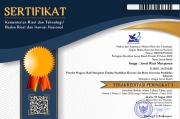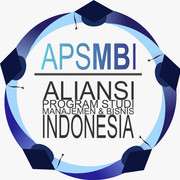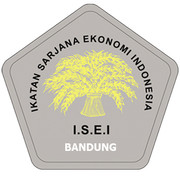Millennial Workers in Ride-Hailing Start-Ups: Preferences, Work-Life Balance, and Retention
Abstract
Millennial workers, as the majority of the workforce in Indonesia, possess unique characteristics such as quick adaptation to technology, a preference for work flexibility, and a high need for work- life balance. However, they also have weaknesses, such as high mobility, dependency on technology, and vulnerability to stress due to high expectations. This study aims to analyze the characteristics of millennial workers in start-up companies, particularly in the ride-hailing sector. A survey method was employed, involving 404 respondents from Go-Jek, Grab, and Maxim. The data were analyzed descriptively to describe demographics, educational levels, tenure, and work preferences. The results show that millennial workers prioritize flexibility, innovation, and technology but tend to have short tenures. These findings provide recommendations for companies to adopt management strategies based on technology, flexibility, and approaches that support employee engagement to enhance retention and productivity.
Keywords
Full Text:
PDFReferences
Agustiyanti, I. (2023). Innovation and employee retention in Indonesia's ride-hailing industry. Journal of Business and Management, 12(1), 88–98.
Allen, R., & Koh, L. (2021). Managing millennial workers in the age of technology. International Journal of Technology Management, 25(3), 190–206.
Bakker, A. B., & Demerouti, E. (2007). Job demands–resources theory: Taking stock and looking forward. Journal of Occupational Health Psychology, 22(3), 273–285. https://doi.org/10.1037/ocp0000056
Bakker, A. B., & Schaufeli, W. B. (2020). The relationship between work engagement and job performance: A review of the literature. International Journal of Human Resource Management, 31(7), 960–989. https://doi.org/10.1080/09585192.2019.1657169
Bass, B. M., & Riggio, R. E. (2023). Transformational leadership (3rd ed.). Psychology Press.
BetterUp. (2023). Millennials in the workplace: How to attract and retain this generation. https://www.betterup.com
Badan Pusat Statistik (BPS). (2020). Indonesia population census 2020. https://www.bps.go.id
Deloitte. (2023). Millennials and Gen Z: Transforming the future of work. Deloitte Insights. https://www2.deloitte.com
Deloitte. (2024). Global Gen Z and millennial survey. https://www2.deloitte.com
Deci, E. L., & Ryan, R. M. (1985). Intrinsic motivation and self-determination in human behavior. Springer. https://doi.org/10.1007/978-1-4899-2271-7
Eisenberger, R., Huntington, R., Hutchison, S., & Sowa, D. (1986). Perceived organizational support. Journal of Applied Psychology, 71(3), 500–507. https://doi.org/10.1037/0021-9010.71.3.500
Garcia, T. (2023). Creating flexible work environments in start-up companies. Journal of Startup Research, 4(2), 145–158.
GoSkills. (2023). Millennial employee retention: 5 best strategies to win them over. https://www.goskills.com
Hendrayati, H., Achyarsyah, M., Marimon, F., Hartono, U., & Putit, L. (2024). The impact of artificial intelligence on digital marketing: Leveraging potential in a competitive business landscape. Emerging Science Journal, 8(6), 2343–2357. https://doi.org/10.28991/ESJ-2024-08-06-012
Herzberg, F. (1959). The motivation to work. Wiley. [DOI tidak tersedia]
Herzberg, F. (2020). The motivation to work in the modern age. Journal of Business Psychology, 35(4), 650–662. https://doi.org/10.1007/s10869-019-09655-0
Janssen, O. (2022). Innovative work behavior in the digital era. Journal of Organizational Behavior, 43(1), 110–128. https://doi.org/10.1002/job.2567
Lauby, S. (2023). The millennial employee experience: Leadership, engagement, and retention. Human Resource Development Quarterly, 34(1), 24–38. https://doi.org/10.1002/hrdq.21456
PricewaterhouseCoopers (PwC). (2023). The future of work: Millennials and Gen Z’s expectations for career growth. https://www.pwc.com
Schaufeli, W. B., & Bakker, A. B. (2020). Work engagement and employee well-being: A meta-analysis. Journal of Occupational Health Psychology, 25(3), 289–302. https://doi.org/10.1037/ocp0000171
Schaufeli, W. B., & Bakker, A. B. (2020). The measurement of work engagement with a focus on work and employee engagement. Educational and Psychological Measurement, 80(2), 267–290. https://doi.org/10.1177/0013164419854173
Zhang, Y., & Liu, S. (2022). Corporate social responsibility and employee commitment in ride-hailing companies: Evidence from Southeast Asia. Asian Journal of Business Ethics, 11(2), 135–150. https://doi.org/10.1007/s13520-021-00137-5
DOI: https://doi.org/10.17509/image.2025.006
Refbacks
- There are currently no refbacks.
Copyright (c) 2025 Raisa Hillia Aini Syifa, Ari Arisman, Heny Hendrayati, Mochamad Achyarsyah, Herdiyanti, Marhadi, Krisztina Taralik, Hayatuk Safrah Salleh

This work is licensed under a Creative Commons Attribution-ShareAlike 4.0 International License.
Image : Jurnal Riset Manajemen is licensed under a Creative Commons Attribution-ShareAlike 4.0 International License
View My Stats



